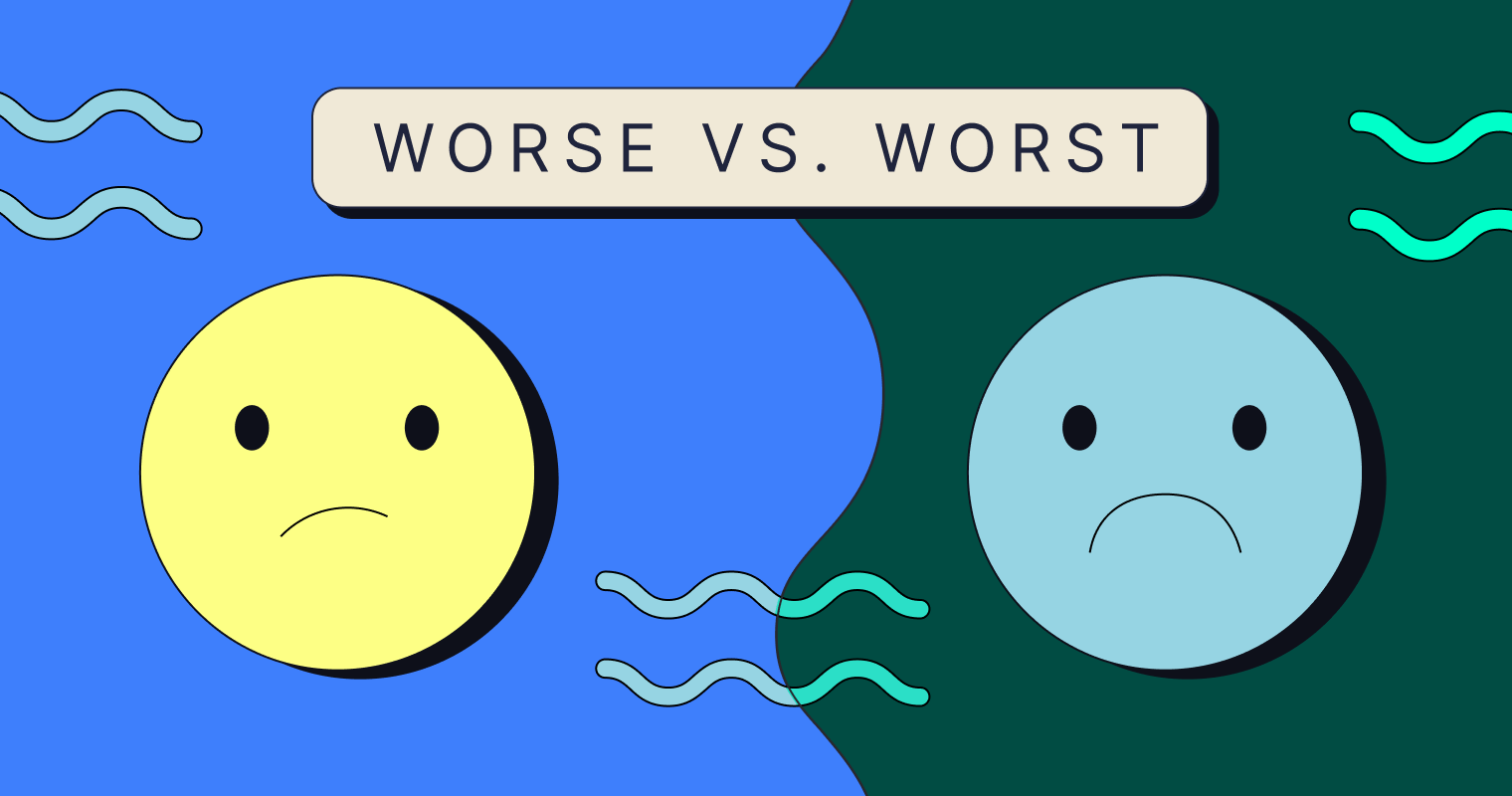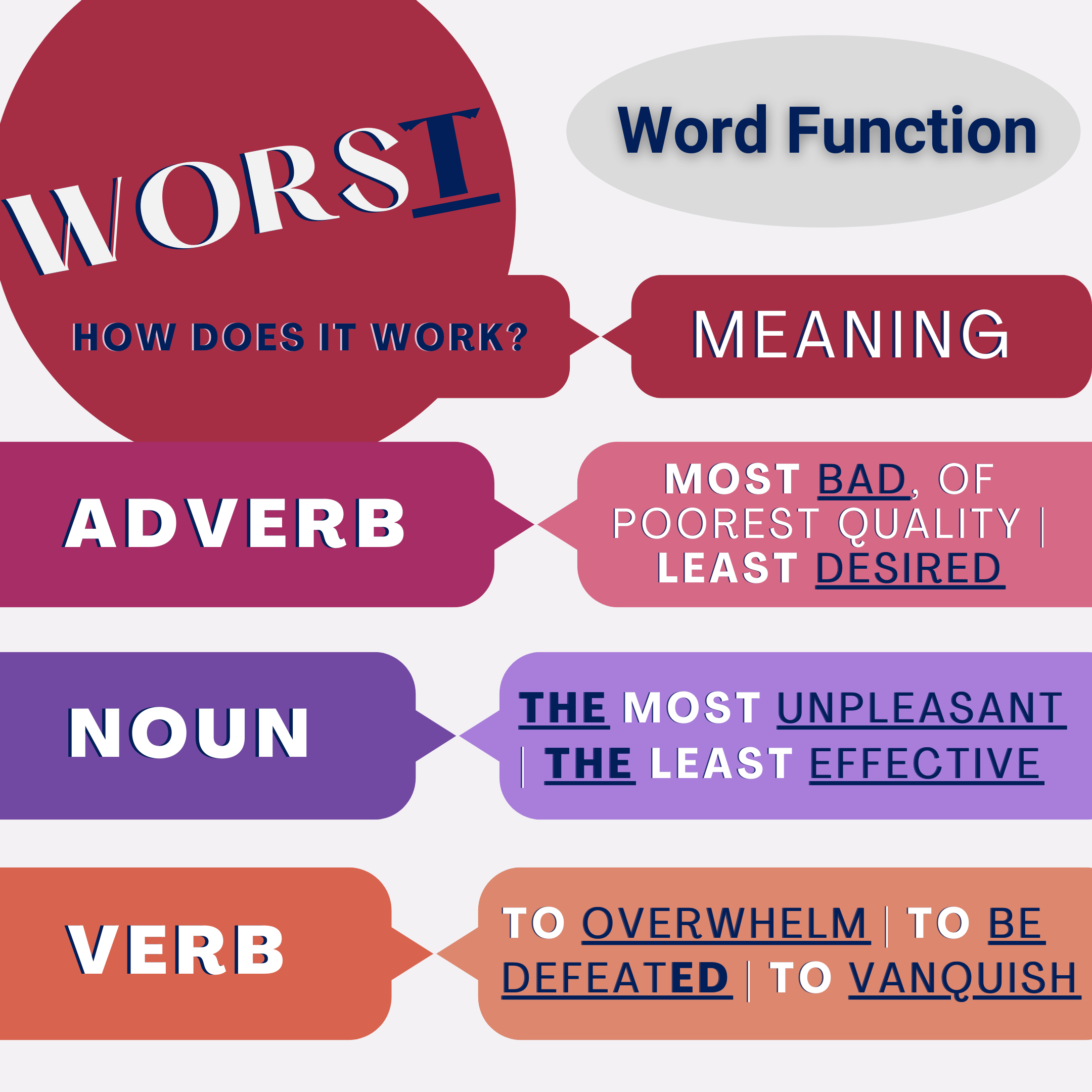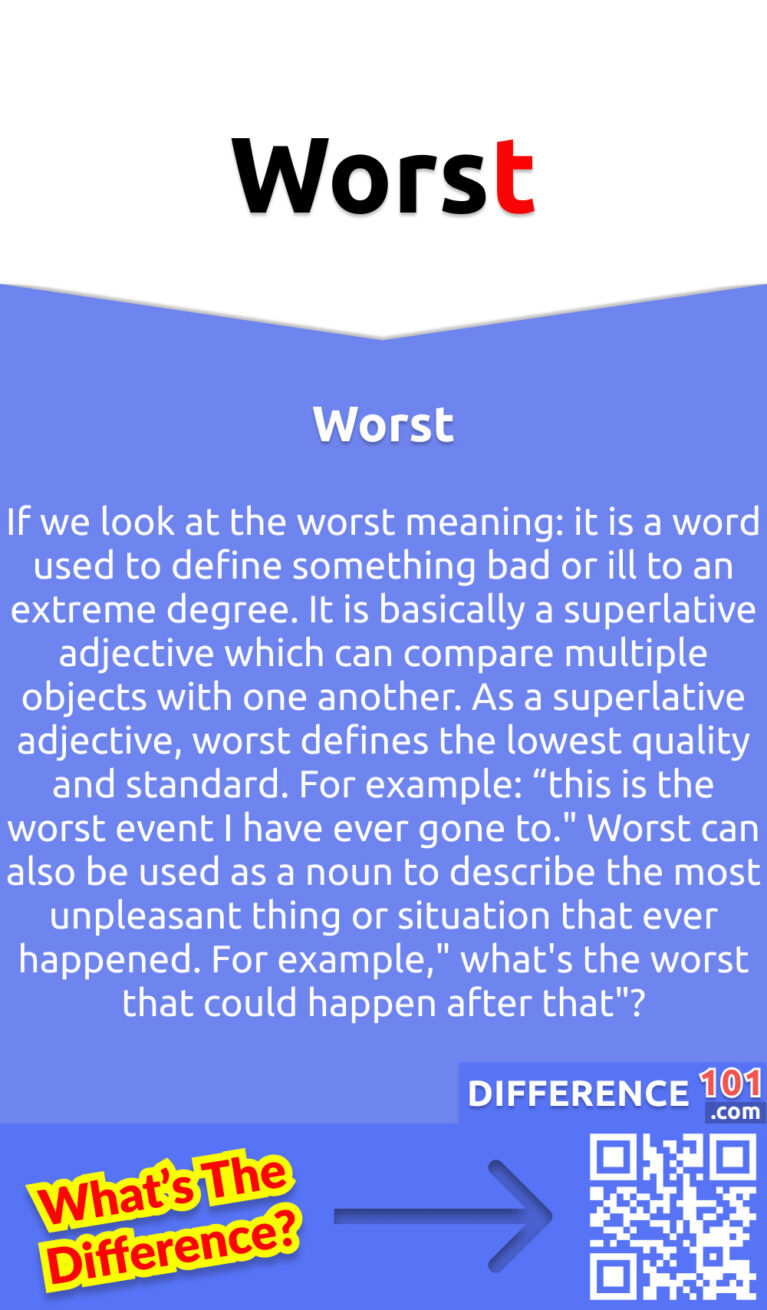Finding Your Fit: What Makes A Place The Worst To Live In Virginia?
Thinking about a move to Virginia, or perhaps just curious about what makes a place less than ideal? It's a very common question, and one that many people ponder when considering where to settle down. When we talk about the "worst places to live in Virginia," we're really getting into what makes certain areas challenging for some folks. You know, it's about looking at what factors can make a community feel less like a dream spot and more like a daily struggle.
The meaning of "worst" is actually quite important here, as my text says, it means "of the lowest quality, or the most unpleasant, difficult, or severe." So, when we use that word for a place, we're talking about areas that might have conditions that are the "least favorable outcome" for residents. It's not always about one single thing, but often a mix of issues that just make daily life harder, arguably.
For many, what counts as "worst" can really change. What one person finds difficult, another might find perfectly fine, or even charming, you know? This article will look into the common reasons why certain spots in Virginia might get that "worst" label. We'll explore what factors can make an area feel less than ideal, and how those things affect people's lives in a real way, actually.
- Polands Newest Billionaire Cashes In On Pandemic Fueled E Commerce Frenzy To Join The Three Comma Club
- Angelina Jolie Sells A Painting By Winston Churchill For More Than 11 Million
Table of Contents
- Understanding What "Worst" Means for Living
- Key Factors That Can Make a Place Less Desirable
- How to Evaluate a Place for Yourself
- Frequently Asked Questions About Virginia Living
- Final Thoughts on Choosing Your Virginia Home
Understanding What "Worst" Means for Living
When someone asks about the "worst places to live in Virginia," they're usually trying to figure out which areas have significant drawbacks. My text reminds us that "worst" describes something that is "of the lowest quality, degree, or standard among others in a particular category." So, in this context, it refers to the most unfavorable or undesirable condition a living environment can present. It's about places where, for various reasons, life might be more challenging or less pleasant for many people, basically.
It's important to remember that "worst" is often a very personal idea. What one person considers a major problem, like a long commute, might not bother someone else at all. For example, some people might prioritize a quiet, rural setting above everything else, even if it means fewer job options nearby. Others might need immediate access to city life, so a remote spot would be their "worst" choice, in a way.
The term "worst" really depends on what you value most in a home and a community. It could mean a place with very few jobs, or perhaps a spot where public services are lacking. Maybe it's an area with higher crime rates, or somewhere that just doesn't feel very welcoming. The idea is to look at a range of common concerns that can make a place genuinely difficult for residents, you know, making it the "least good" option for many.
- Alex Trebek Donated Jeopardy Wardrobe So Down On Their Luck People Would Have Clothes For Job Interviews
- Ramona Rizzo Net Worth
Key Factors That Can Make a Place Less Desirable
When people talk about the "worst places to live in Virginia," they are often thinking about specific issues that impact daily life. These issues can really add up, making an area feel less than ideal for residents. It's almost like a puzzle, where if too many pieces are missing, the picture isn't complete or enjoyable. We can look at several common factors that contribute to an area being seen as less desirable, or even the "most unpleasant," as my text puts it.
Economic Struggles and Job Opportunities
One of the biggest concerns for anyone looking for a home is finding steady work. Areas with very limited job prospects can quickly become challenging. If there aren't many businesses or industries around, people might struggle to find employment that pays enough to live comfortably, or even at all. This can lead to a cycle of economic difficulty for families, you know?
A place where jobs are scarce can also mean that wages are lower, even for the jobs that are available. This makes it tough to afford housing, food, and other necessities. So, too, a lack of economic opportunity can really affect the overall health and happiness of a community. It's a fundamental issue that many people consider when deciding where to live, arguably.
When unemployment rates are high, or when the only jobs available don't offer much growth, it can make a place feel stagnant. This economic pressure is a major factor that contributes to an area being considered less desirable. People often look for places where they can build a career and support their families, and if those chances are not there, it's a big hurdle, in some respects.
Safety Concerns and Community Well-being
Feeling safe in your own home and neighborhood is incredibly important for peace of mind. Areas with higher crime rates, whether it's property crime or more serious issues, can be a huge deterrent for people. Nobody wants to constantly worry about their safety or the safety of their loved ones when they are just living their daily lives, right?
Beyond just crime statistics, the overall sense of community well-being matters a lot. This includes things like how well neighbors get along, if public spaces are cared for, and if there are programs for kids and families. If a community feels neglected or if there's a lot of tension, it can really affect how people feel about living there, you know, making it a "most unpleasant" experience.
A lack of public safety resources, like effective police presence or community support programs, can also contribute to these feelings. When people don't feel secure, it impacts everything from letting their children play outside to their willingness to invest in their homes. It's a very real concern that shapes how people perceive an area, literally.
Access to Services and Amenities
Having easy access to essential services is something we often take for granted until it's missing. This includes things like good schools, quality healthcare facilities, and reliable emergency services. If these basic necessities are far away or hard to get to, it can make daily life quite inconvenient and even stressful, too it's almost.
Beyond the basics, amenities like grocery stores, parks, libraries, and places for recreation also play a big part in quality of life. A place that lacks these things can feel isolated and boring, especially for families or people who enjoy an active lifestyle. Imagine having to drive a long way just to pick up milk or take your kids to a playground, you know?
When these services and amenities are sparse, it limits opportunities for residents and can make a place feel less vibrant. It’s a factor that many people weigh heavily when choosing a home, because it directly impacts their day-to-day comfort and convenience. A place with very few options can quickly become a less appealing spot to call home, that is that.
Housing Challenges and Cost of Living
The cost of living, especially housing, is a huge factor for most people. In some parts of Virginia, housing prices can be extremely high, making it difficult for average families to afford a decent place to live. Even if there are jobs, if the rent or mortgage payments eat up too much of a person's income, it creates a lot of financial strain, you know?
Beyond just the price, the availability and quality of housing can also be an issue. Some areas might have very few homes for sale or rent, or the existing housing stock might be old and in need of major repairs. This lack of suitable options can force people into less-than-ideal living situations, which can be very frustrating, actually.
When housing is either too expensive or too hard to find, it becomes a major barrier for people looking to settle down. This challenge can lead to overcrowding, long commutes, or simply an inability to find a comfortable place to call home. It's a very practical concern that can make an area feel like a "most difficult" place to live, as my text says.
Environmental Factors and Natural Disasters
While often overlooked, environmental conditions can significantly impact how desirable a place is. This could mean areas prone to frequent natural disasters like flooding, hurricanes, or severe storms. Living with the constant threat of damage or displacement can be incredibly stressful and costly for residents, you know?
Other environmental concerns might include poor air quality, contaminated water, or proximity to industrial sites that cause pollution. These issues can affect people's health and overall well-being, making a place less appealing for long-term residence. Nobody wants to live somewhere that negatively impacts their health, very really.
Even things like extreme weather patterns, whether it's very hot summers or harsh winters, can make a location less comfortable for some. These environmental factors, though sometimes out of human control, are definitely part of what makes a place feel like a "lowest quality" living environment for many, in a way.
Transportation Woes and Commute Times
Getting around is a daily necessity for most people, whether for work, school, or errands. Areas with very poor public transportation options or heavily congested roads can make life much harder. Long, frustrating commutes can eat up hours of a person's day, reducing their free time and increasing stress, you know?
For those who rely on public transit, a lack of reliable buses or trains can limit their access to jobs, healthcare, and other services. This can be a significant barrier, especially for individuals who don't own a car. It's a very practical concern that affects daily routines and overall quality of life, basically.
Even for drivers, constant traffic jams and a lack of good road infrastructure can turn a short trip into a nightmare. The time and money spent on commuting can quickly add up, making an otherwise decent area feel much less appealing. A place with significant transportation issues can definitely be seen as "difficult" by many residents, you know, in that case.
How to Evaluate a Place for Yourself
Given that "worst" is often a personal feeling, the best way to figure out if a place in Virginia is right for you is to do your own homework. Start by thinking about what matters most to you and your family. Is it safety, good schools, job opportunities, or perhaps a quiet lifestyle? Making a list of your priorities can really help narrow things down, you know, as a matter of fact.
Once you have your priorities, research specific areas that interest you. Look up things like local crime statistics, school ratings, and job market trends. Websites that provide community data can be very helpful for this. You can also check out online forums or social media groups for residents of those areas to get a feel for what daily life is like there, honestly.
If possible, actually visit the places you're considering. Spend time in different neighborhoods during various times of day. Drive around during rush hour to see what the commute is like. Talk to people who live there – neighbors, local business owners, or even people at a park. Their firsthand experiences can give you insights that data alone cannot, very really. Learn more about Virginia communities on our site, and link to this page finding the perfect spot.
Consider renting for a short period before making a big commitment to buy a home. This gives you a chance to truly experience the area and see if it fits your lifestyle and needs. It's like a test run, allowing you to discover any hidden challenges or pleasant surprises before you're fully settled, you know, just a little.
Remember that what makes a place "worst" is subjective, as my text implies, meaning it's "the most unfavorable or undesirable condition that can be observed or experienced" by you. Your personal circumstances, preferences, and tolerance for certain challenges will ultimately determine if an area is a good fit. Take your time, gather information, and trust your gut feeling, you know?
Frequently Asked Questions About Virginia Living
What is the most dangerous city in Virginia?
When people ask about the "most dangerous" city, they're typically looking at crime rates. However, it's important to look beyond just raw numbers. Crime can vary a lot even within a single city, with some neighborhoods being much safer than others. Official sources like the FBI's Uniform Crime Reporting (UCR) Program or local police department reports can offer statistics, but they don't always tell the whole story about how safe a person feels in their daily life. It's usually better to look at specific neighborhood data and talk to local residents, you know, for instance.
What is the cheapest city to live in Virginia?
The "cheapest" city to live in Virginia depends on what expenses you're considering. While some rural areas might have lower housing costs, they could also have higher transportation costs due to longer commutes or less access to services. It's about balancing housing prices with other living expenses like utilities, groceries, and transportation. Generally, areas further from major metropolitan hubs like Northern Virginia or Richmond tend to have lower costs of living, but that's not always the case for every expense, you know, more or less.
What is the safest place to live in Virginia?
Defining the "safest" place often involves looking at low crime rates and a strong sense of community. Many smaller towns and suburban areas across Virginia are known for being very safe and having close-knit communities. These places often have good schools, active neighborhood associations, and residents who look out for each other. However, what feels "safe" can also be subjective, depending on a person's comfort level and experiences. It's often a blend of low crime numbers and a generally peaceful, well-maintained environment, you know, pretty much.
Final Thoughts on Choosing Your Virginia Home
Choosing a place to live is a big decision, and what makes an area "worst" or "best" is really up to each individual. My text says "worst" means "least favorable outcome," and that outcome is shaped by your own needs and hopes. It's about finding a spot that truly fits your life, with all its unique demands and desires. There are many wonderful communities across Virginia, each with its own special feel and advantages, very really.
The key is to do your homework and consider all the factors that are important to you. Think about jobs, safety, the services available, and how much things cost. By understanding what you need and what an area offers, you can avoid places that might be challenging for you and find a home that genuinely makes you happy. It's about making an informed choice for your future, you know, at the end of the day.

301 Moved Permanently

worse vs worst what is the difference?

Worse vs. Worst: 7 Key Differences, Pros & Cons, Examples | Difference 101